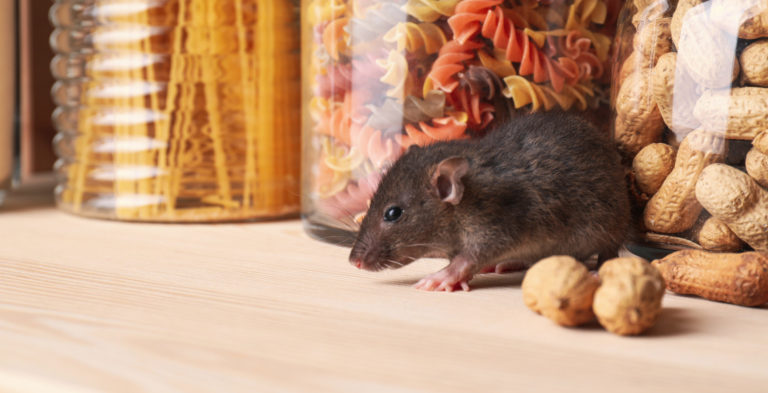Your kitchen is the heart of your home, but it can also be a target for unwelcome guests—rodents. Rats and mice are not only a nuisance, but they pose serious health risks by contaminating food and surfaces with bacteria. Fortunately, there are effective ways to rodent-proof your kitchen and ensure your home remains pest-free while maintaining food safety.
In this blog, we’ll cover practical steps to help you keep rats out of your kitchen and provide tips on maintaining a safe, clean environment.
Why It’s Important to Rodent-Proof Your Kitchen
Rodents are drawn to kitchens for one simple reason: food. Even small crumbs and food scraps can attract rats and mice. Once inside, they can spread diseases like salmonella and hantavirus by contaminating food, countertops, and utensils.
Beyond health risks, rodents can also damage your property. They chew through wires, pipes, and insulation, which could lead to electrical issues or costly repairs. By taking steps to rodent-proof your kitchen, you not only protect your food but also avoid the structural damage that rodents can cause.
Rodent Prevention Tips for a Safe Kitchen
Here are some rodent prevention tips to help you secure your kitchen and keep these pests at bay:
1. Seal All Food Containers
Rodents have a keen sense of smell and can chew through flimsy packaging to reach food. To prevent this, store food items in airtight containers made of metal, glass, or heavy-duty plastic. Keep dry goods like cereal, pasta, and flour sealed to reduce the risk of attracting rodents.
2. Clean Up Crumbs and Spills Immediately
One of the simplest ways to rodent-proof your kitchen is by keeping it clean. Wipe down counters, sweep floors, and clean up crumbs and spills as soon as they happen. Regularly empty your trash bin and make sure it’s covered with a tight-fitting lid to minimise food scents that attract rodents.
3. Check for Entry Points
Rodents can squeeze through even the smallest gaps, so it’s crucial to inspect your kitchen for potential entry points. Look for cracks, holes, or gaps around windows, doors, plumbing, and vents. Seal any openings with steel wool, caulk, or wire mesh to prevent rodents from getting inside.
4. Keep Pet Food Secure
If you feed your pets in the kitchen, be mindful of leftover food. Store pet food in airtight containers and remove any uneaten portions right away. Rodents can easily sniff out pet food, so keeping it secure is an important part of kitchen food safety.
5. Don’t Leave Dirty Dishes Overnight
Leaving dirty dishes in the sink overnight provides a food source for rodents. Make it a habit to wash dishes and clean your sink before going to bed. This simple step can go a long way in keeping your kitchen rodent-free.

Health Risks Associated with Rodent Infestations
Rodents are known carriers of diseases that can be transmitted to humans through their urine, droppings, or saliva. Some of the most common health risks include:
- Salmonella: Often spread by contaminated food, salmonella can cause severe gastrointestinal issues.
- Hantavirus: A respiratory disease that can be fatal if contracted, hantavirus is spread through rodent droppings and urine.
- Leptospirosis: This bacterial infection is transmitted by rodent urine and can lead to kidney damage or liver failure if not treated.
By taking steps to rodent-proof your kitchen, you protect your family from these health risks while maintaining a clean and safe food environment.
Additional Tips to Keep Rats Out of Your Kitchen
In addition to sealing food and cleaning regularly, there are other steps you can take to make your kitchen less attractive to rodents:
- Fix Leaks: Rodents are drawn to water sources. Repair any leaking faucets or pipes in and around your kitchen to deter them from entering.
- Organise Pantries: Keep your pantry organised and store food off the floor. Regularly inspect pantry shelves for any signs of rodent activity, such as droppings or chew marks.
- Use Natural Deterrents: Some natural ingredients, like peppermint oil and cloves, can act as rodent repellents. Placing cotton balls soaked in peppermint oil around the kitchen can help keep rodents away.
When to Call a Professional
If you’ve tried these preventive measures but still suspect a rodent problem, it’s time to call in a professional. Flick Pest Control Services offers comprehensive rodent control solutions to safeguard your home. Their experts can assess your kitchen, identify entry points, and develop a tailored treatment plan to ensure your home remains rodent-free.
Rodent-proofing your kitchen is an essential part of maintaining a clean, safe, and healthy home. By following these simple tips, you can protect your kitchen from rodents and reduce the risk of contamination. Keeping food sealed, cleaning up promptly, and checking for entry points are all key steps in ensuring kitchen food safety.
Don’t wait for a rodent infestation to take over your home. Stay proactive and implement these rodent prevention tips to secure your kitchen and enjoy peace of mind.
Enjoyed this article?
If you found this article helpful, sign up for our free Quarterly Newsletter to receive all our tips and tricks on pest control and washroom hygiene.
Sign Me Up!